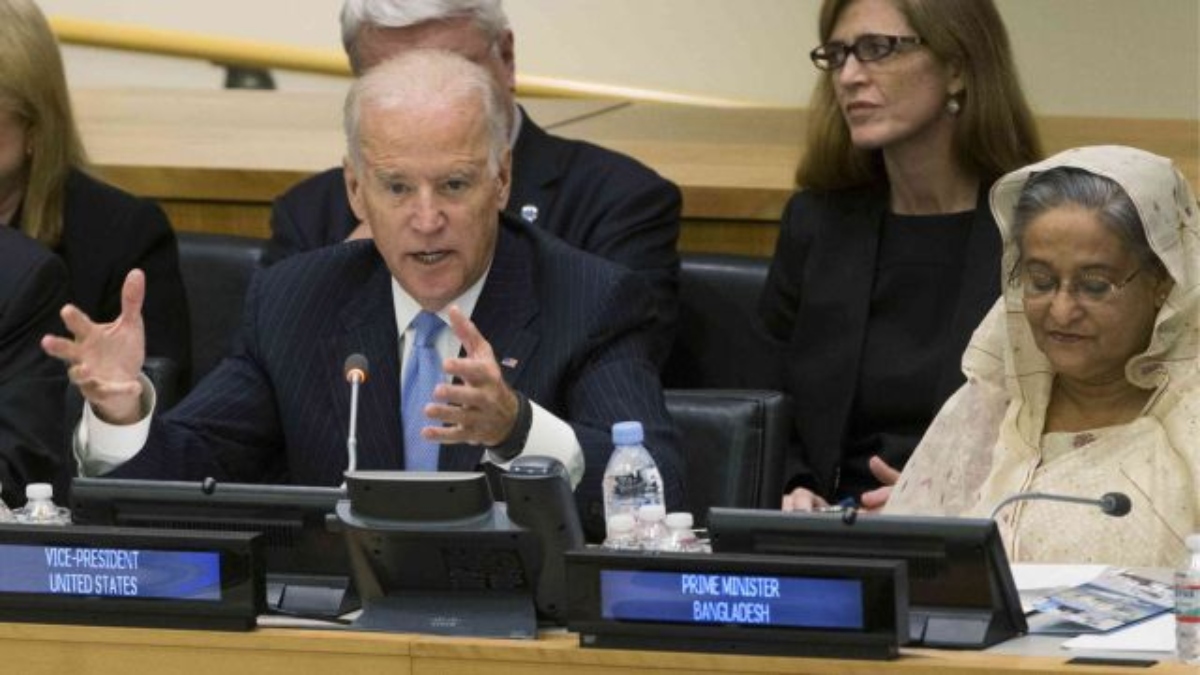The United States called on Bangladesh to uphold the ‘right to peaceful protests’. The comment resonated with the statements made by Bangladesh’s Prime Minister Sheikh Hasina when the pro-Palestine protests engulfed the campuses in America read more
)
File photo of US President Joe Biden alongside Bangladesh Prime Minister Sheikh Hasina. Reuters
Bangladesh and the United States, the two nations that witnessed violent campus protests exchanged lessons over how to curb the demonstrations in their respective nations.
On Wednesday, the United States called on Bangladesh to uphold the “right to peaceful protests”. The comment resonated with the statements made by Bangladesh’s Prime Minister Sheikh Hasina when the pro-Palestine protests engulfed the campuses in America.
Bangladesh is currently reeling through violent protests against the government’s job quote system. In an effort to curb the demonstrations, the country’s law enforcement fired tear gas and rubber bullets and the brutal clashes left at least six dead and scores injured.
What the US said on the matter?
While addressing the matter at a regular press briefing, US State Department spokesperson Matthew Miller said that Washington outrightly condemns the “violence against peaceful protesters”.
“We condemn any violence against peaceful protesters. We’ve been watching this matter very closely, both from our embassy and officials here in Washington. (We) have been monitoring the protests, and have seen the reports of people dying, or being killed in the protests,” Miller said on Wednesday.
“And we again, call on the government to uphold individual’s rights to protest peacefully,” he added.
The comments resonated with the ones made in the past
The comments by the US Department of State came months after Bangladeshi PM Sheikh Hasina condemned Washington over how they treated the pro-Palestine protesters who staged demonstrations across the country.
In May this year, the prime minister questioned whether “such a move was part of the US democracy.”
“The biggest thing is that 900 students and teachers have been arrested for staging pro-Palestinian demonstrations. It has happened in the US … it’s a part of (US) democracy, and we have to hear that too,” Hasina said at a news conference during her visit to Thailand.
“It is a real misfortune to listen to lectures on human rights from the US. Incidents of shootings are happening in schools, shopping malls, and restaurants and people are dying. It seems that there is not one day that people are not killed in America,” Hasina averred, adding: “The US should take care of their human rights situation first."
What is happening in Bangladesh?
The protest against the government’s job quota system went violent this week when thousands of anti-quota protesters clashed with members of the student wing of the ruling Awami League party across the country.
Six people, including at least three students, were killed in the clashes that prompted several nations to issue travel advisories for their nationals in Bangladesh.
The controversial job quote proposed by the government includes a 30 per cent reservation for family members of fighters from the 1971 War of Independence from Pakistan. The quotas caused anger among students who faced high youth unemployment rates. As per recent data, nearly 32 million young Bangladeshis are not in work or education out of a total population of 170 million people.
The simmering tensions between Bangladesh and the US
The tensions between the two nations reached an all-time high during the Bangladesh General elections when Hasina’s seat was at stake. The election became controversial after the Bangladesh Nationalist Party (BNP) led by jailed former prime minister Khaleda Zia, boycotted the polls alleging that it would be a futile and unfair exercise under her administration.
After Hasina came back to power, Washington said that the polls were not free and fair. “The United States remains concerned by the arrests of thousands of political opposition members and by reports of irregularities on election day,” the US State Department said in May.
“The United States shares the view with other observers that these elections were not free or fair and we regret that not all parties participated,” Washington furthered. Even before the elections, the US cast doubts on the integrity of the polls. Meanwhile, Hasina attempted to fend off the pressure which many claimed came due to her closeness with China.
Hence, the recent exchange of jabs over campus protests indicated that the US-Bangladesh relations continue to remain sour.
With inputs from agencies.

 2 months ago
65
2 months ago
65
)
)
)
)
)
)
)
)
)
)
)
)
)
)
)
)
)
)
)
)
)
)
)
)
)
 English (US) ·
English (US) ·